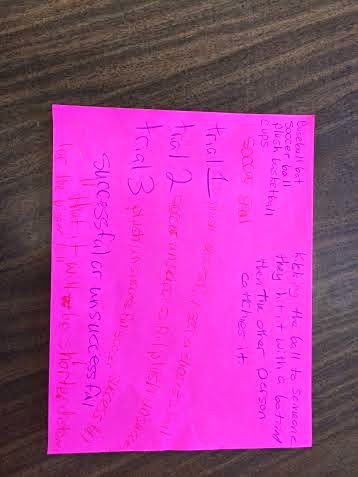The first step: Working in groups, students discussed and shared ideas about what would they be testing about the sport chosen. Once they decided on what they would be testing they had to come up with a testable question and design the experiment: What would be measured? How would it be measured? What materials would be used? What would the procedures/steps of the experiment be? How would they record the data? It was important to get all this down on paper before heading outside to test.
Next step: Once all the details were discussed and decisions were made about how they would go about in their investigation it was time to do a final check to make sure all pieces were ready to go.
Next step: With all their materials and experiment design on hand, the scientists headed outside to do their investigations.
Next step: It was very important observations and data were collected so that analysis and conclusions could be done.

Next Steps: Once all data was collected and all trials were conducted, the scientists headed back inside to look through their observations and data. Analysis of these pieces was conducted and conclusions were made. Had the experiment answered the testable question? Was the prediction/hypothesis correct? What could have improved the experiment and if the experiment could be done again, what would we do differently and why?
Final step: We discussed how sharing findings/results is a vital component of a scientific community. It is only when discoveries from experiments are shared that more is learned about what we study! So each group shared their findings about the investigation they had conducted and what they had learned from it.
This group tested if the size of the ball mattered in terms of speed when batting. They shared how they started by kicking the ball (combining sports), conclusions were that yes, size matters and how the ball is thrown will affect its speed. They also shared that perhaps they have discovered a new sport! A combination between soccer and baseball? Maybe that is what kickball is all about? Keep it up ladies, you never know!
This group wanted to know if the the way one stands/uses legs makes a difference in making a basket in the sport of basketball. Their findings showed that yes it does! Without jumping there is less energy and force that go into the ball. Way to go girls!
This group wanted to know how a goalie can improve his/her skill at stopping the ball from scoring by studying how the opponent kicks the ball at the goal. Does angle matter? Does speed matter? The answers to both are a big YES! According to the data, it is vital that goalies study their opponents best kickers, it may save the game! Well done young men!
This group wanted to know why the baseball that is used for a baseball game is that specific size (density, mass, circumference, etc.). Does this matter when trying to score runs? They also added the human component to their investigation: How much does cooperation between athletes plays a role when trying to score a run? Findings showed that both of these factors matter! However, an interesting observation is that according to their data, it was the trial using a plush ball which weighs less than a baseball that helped the winning team score runs. In terms of cooperation, it turns out that it does matter greatly but that perhaps more needs to be studied in this area because ability on how to play the sport may also be a huge factor.
All in all, each group of scientists did a great job! They proved that science plays a very important role in sports and had fun in the process! Well done young scientists!






























No comments:
Post a Comment